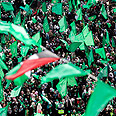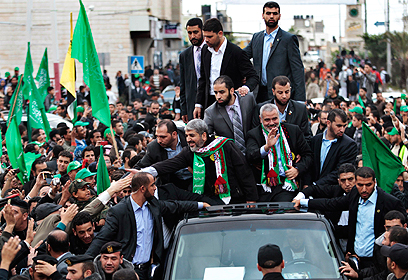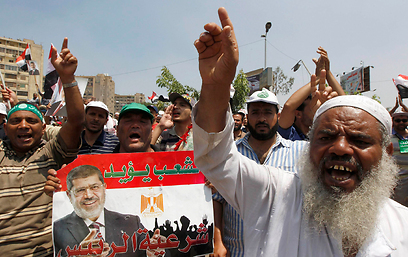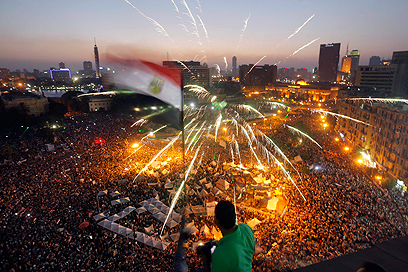
Gaza: Hamas 'biggest loser' of Morsi's overthrow
Analysis: As rift with Iran, Hezbollah grows due to Hamas's support of Syrian rebels, Morsi's fall deals Hamas harsh blow, leaving it more isolated, influencing ties with Fatah. Will Gaza's residents attempt uprising of their own?
"But we are afraid of dramatic changes," Yousef said, adding that Hamas "is afraid things will spiral out of control and that there will be bloodshed." He was right about the first part – the military overthrow did have major implications and Hamas – as a source close to the Gaza government told Ynet – "is in complete and utter shock."
Related stories:
- Brotherhood: Overthrow will 'push other groups to use force'
- Egyptians protest against Hamas
- Egyptian army deposes Morsi, deadly clashes erupt
The Palestinian Authority welcomed the news of the second Egyptian revolution. Palestinian President Mahmoud Abbas didn't miss a beat and by morning had already sent a congratulatory letter to interim Egyptian President Adli Mansour, expressing hope that he will succeed in realizing the Egyptian people's dream of freedom, honor and stability.

Hamas's Gaza leadership (Photo: Reuters)
However, more than 24-hours after the fall of Morsi's regime, not a single Hamas representative from either its Gaza or international branches has said a word regarding the developments in Egypt.
Eventually, Hamas's leadership will have to release a statement welcoming the new president, a statement that will have very little to do with their true hearts' desire; however it is telling that on the night of Febuary 11 2011, the day Hosni Mubarak was ousted, Gazans and their Hamas leaders were literally dancing on rooftops in celebration.

Morsi supporters in Egypt (Photo: Reuters)
At the time, Hamas's leadership was quick to exhibit their schadenfreude and publicly exclaim what had up until then only been said behind closed doors. A year and a half later, when their brethren from the Muslim Brotherhood won the election and took the reigns of control, Hamas was ecstatic.
However, the political events in Egypt had already begun exerting influence on life in Gaza, even while Morsi's presidency was still intact. For more than a month, Egypt's army has been hard at work battling the systems of tunnels connecting the blockaded strip to the port city of Rafah.

Egyptians celebrate, while Hamas keeps mum (Photo: AP)
For more than a week all tunnel movement has come to a complete standstill barring the transfer of small quantities of diesel fuel, official data published Hamas revealed; and a halt in the flow of goods immediately caused prices to skyrocket.
The Rafah crossing is open and operational, but according to Hamas's Deputy Foreign Minister Razi Hamed, last week only 600 people were permitted to pass daily into Sinai, as opposed to 1,200 usually allowed. In addition, the last few days have seen an influx in Palestinians returning from Egypt to Gaza fearing for their safety in light of the developments in the country and the anti-Hamas sentiment prevalent in Egypt. Both developments seem to work poorly for Hamas.
Gaza spring?
However, not everyone is displeased. Those in Gaza not affiliated with Hamas expressed hope that the events in Egypt would influence those taking place in Gaza. According to a source from outside Hamas's ranks, the fact that Hamas has lost its largest patron makes the organization the first and possibly biggest loser of Morsi's historic fall.
The source also expressed hope that Gaza would one day see the likes of a Palestinian Tamarod ("rebellion") movement, active in protesting Gaza's Hamas government.
According to the source, the basic condition that rendered the second Egyptian revolution possible – namely the support of the military apparatus – does not hold true in Gaza. They understand that without military support – in their case, without the support of Hamas's security echelon – there is not even a sliver of hope for such a protest movement to materialize, let alone succeed in toppling Hamas's regime.
A Palestinian source in Gaza told Ynet that residents of the strip are wary of protesting against Hamas because it is almost certain that the group's security organization would arrest them immediately afterwards; nonetheless, he said there many other problems people could protest against.
Hamas, which even while Morsi was still in power was almost completely isolated from the Arab world, finds itself faced with an additional problem.
The group's ties with Iran and Hezbollah are at an all time low because of latter two's involvement in supporting Assad's regime, while Hamas has chosen to support the Syrian rebels.
Qatar and Turkey are now the only friendly faces the Islamist organization has in the region; however, unlike Iran, the two states make certain the funds they funnel into the strip are invested in civilian projects of rebuilding the strip, and not military ones.
Having no other choice, it is possible that these circumstances will force Hamas to reconcile with the rival Fatah movement. But, as the proverb goes, it takes two to tango and it is far from certain that Abbas is interested in granting the movement the support and legitimacy it so desperately needs, now more than ever.
You can contact Elior Levy, Ynet's Palestinian Affairs Correspondent, at: paldesk @gmail.com
- Receive Ynetnews updates directly to your desktop










